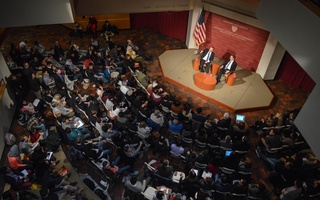University President Drew G. Faust called for investing in higher education to combat economic inequality on Wednesday, speaking before an audience of students, professors, and local residents at a town hall meeting at Roxbury Community College.
Faust’s opening remarks and a subsequent panel discussion, part of ongoing HUBweek forums and festivities, addressed the issue of “Economic Growth For All.” It was organized by Setti D. Warren, the mayor of Newton and the U.S. Conference of Mayors’ community development and housing committee chair. {shortcode-e6ac72d4a1db2aec2a6cbbe9790859f853bd3d0a}
“Any discussion about reducing inequality in this country, and creating economic growth that reaches everyone, has to begin with investing in education—from early learning all the way through higher education,” Faust said in her speech, which largely emphasized the role of universities in providing the “intellectual infrastructure” for economic growth in cities.
“All of you, and mayors across the country, should view the universities in their communities as assets, as infrastructure, and as allies,” Faust said, addressing city mayors who were in attendance.
“Universities and their host cities should link arms and together drive progress, particularly as it relates to the sharing of knowledge that comes from universities and can be applied to to students in K-12,” Faust said.
Following Faust’s speech and brief pre-taped video addresses from Boston Mayor Marty J. Walsh and U.S. Senator Elizabeth Warren of Massachusetts, the panel of mayors and economic experts further discussed economic inequality and immobility.
“We live in an era of staggering inequality, certainly in regard to wealth, but also in regard to opportunity,” said Boston Globe editor Brian McGrory, who moderated the panel. Many of the panel participants emphasized the importance of education in combating issues of race and income inequality.
The town hall meeting, hosted by the U.S. Conference of Mayors, also served as a platform for Newton Mayor Setti Warren’s America Leads 2050 initiative, which focuses in part on education.
One goal of the initiative, according to Warren, is to “engage as many civic leaders, widely-recognized public and private institutions like Harvard, and members of the public as possible to focus on what is being done to connect people with the economic opportunities they and their families need to be financially independent.”
“[Faust] framed the discussion so well and spoke poignantly to the importance of education in helping people prepare for a successful career and give them access to pipelines to the middle class,” Warren wrote in an email.
The town hall meeting comes in the middle of HUBweek, which will continue to host events in Cambridge and Boston through this Saturday.
—Staff writer Emma K. Talkoff can be reached at emmatalkoff@college.harvard.edu.
Read more in University News
At the Margin: Harvard Economics’ Precarious Spot on TopRecommended Articles
-
Averting AristocracyThe 2004 general presidential race has not yet formally begun, and I’m already bored with the debate on economic policy.
-
 Obama Colleagues Summers and Furman Talk Economic Growth
Obama Colleagues Summers and Furman Talk Economic Growth -
Ivy League Native American Students Convene at ConferenceFrom Friday to Sunday, the conference consisted of socials, panel events, and keynote addresses all focusing around the conference’s theme of “Economic Vibrancy in 21st Century Native Communities.”
-
 Larry Summers Talks Income Inequality at IOP
Larry Summers Talks Income Inequality at IOP -
 HKS Receives $2.5 Million for Economic Inequality Research
HKS Receives $2.5 Million for Economic Inequality Research













